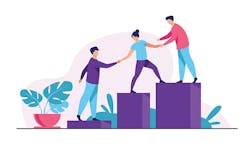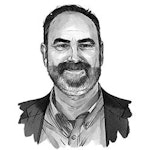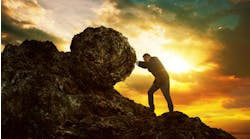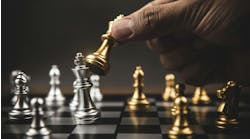Last week, one of my earliest inspirations and mentors died. He was someone who was very influential to me in my early adulthood. He was the first person (outside my family) to really challenge me on some very rough edges I had (have?), as well as believe wholeheartedly in my ability to lead others. He gave me both the correction and confidence I so desperately needed—and, as you likely know, that is not an easy thing to do! Calibrating challenge and confidence-building is more art than science, but it is essential if we want to help people grow, whether that’s as a parent, manager, or leader of leaders. Floyd, my first mentor, had it down pat. Over the course of his long career, he developed tens of thousands of leaders. I feel privileged to be one of them.
Floyd’s passing has me wrestling with questions that are likely going to provoke some shifts in my future. I am happy to share the questions, along with the context for each one, but I don’t have any answers or silver bullets just yet. As a columnist, I sometimes feel pressure to offer answers to knotty problems in our industry. If you’ve read my columns for any length of time or heard me speak, you know that I tend toward what some call the “soft skills” side of things. It’s not that I don’t love the technical side of our industry or all the emerging technology and trends affecting us (I actually do), but I have a strong bias that our biggest challenges are rooted in people, in relationships.
Spoiler alert: That “people bias” comes out strongly in this particular column. I’m hoping that these questions will spark something for you, just as they have for me. My hope for anyone who reads this is that a reflection on what matters most to you will surface through a handful of questions I offer here.
The Question
The question that losing Floyd prompted for me was: What dreams did I have as a young man that I never got around to that might be rekindled in this season of life?
Shortly after hearing about his passing, a friend celebrating his 60th birthday posted the following on Facebook: “I’m celebrating my 60th birthday with family and friends tonight. I have grown old. I sometimes feel like the first old man in my world. I grew up without grandfathers. Both of them abandoned their families when my parents were young. So, I didn’t have old men in my life. My own father died in his 50s, as did my father-in-law. So, my daughters also grew up without grandfathers. I have only one close older friend. Everyone coming to my party tonight is younger than me, some much younger. I used to look for aging mentors, but I have given up and embraced the calling as a pioneer greybeard, the first of my name. As Stephen Jenkinson writes, ‘We grow old. You can consider that an affliction or you can consider it an assignment.’”
As I move into the next phase of my career, that sentiment from my friend got me thinking: How do I go from endlessly looking for a mentor to being one? It’s become increasingly important for me to give back, and I’m kicking around ideas for the best ways to do that.
I recently saw an interview where Richard Branson (founder of the Virgin brands) asked Simon Sinek, “If you were starting a business right now, what problem would you set out to solve and why?”
Sinek answered, “The problem I would like to help solve these days is how we relate to each other.”
There it is again: how we relate to each other. Not some knotty technology problem. Not some emerging trend. But simply, relating well to others. Sinek elaborated on his initial answer with some specifics:
- We’ve become too judgemental.
- We don’t listen well.
- We don’t see problems as gray but rather black and white, “I’m right, you’re wrong,” win/lose.
- We lack empathy.
- We resist difficult conversations.
Those stuck with me. How can I continue to grow as a leader by becoming a better human being who has empathy, listens well, and doesn’t avoid hard conversations? Again, I don’t have the answers yet, but I look forward to sharing more insights as I continue to dig deep.





